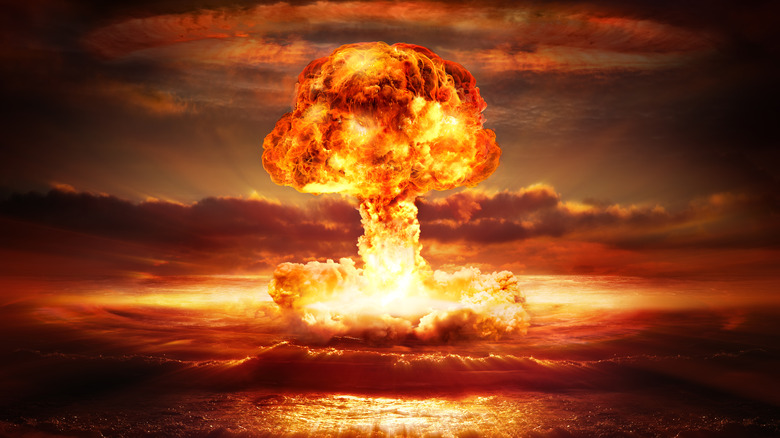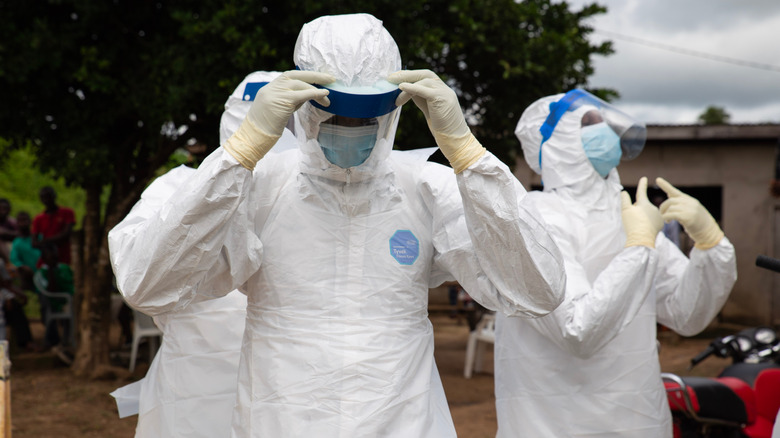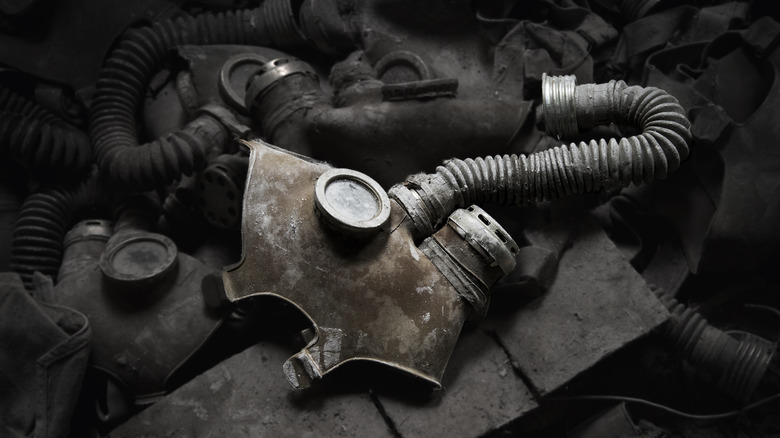Modern Weapons That Could Be Even More Dangerous Than A Nuclear Bomb
The devastation nuclear weapons can cause is widely known. Although many have been tested, only two have been detonated but their impact was enough to bring about an almost immediate end to World War II — and fuel global fear ever since. When it comes to sheer destruction, nukes are the worst humanity has to offer. The warheads currently possessed by the United States, Russia, United Kingdom, France, China, Pakistan, India, North Korea and Israel, are far more powerful than the fission bombs dropped by the U.S. military on Japan in 1945. If one were to be dropped on a major city now, millions could die in the inital blast, with many in the wider blast radius suffering from burns, blindness, and radiation-related illnesses.
While nukes are indeed awful, there are other weapons that are arguably worse. They are less controllable, easier to manufacture, and some could even wipe out all of humanity. Lets take a look at a few weapon classes that have the potential to be more devastating than a nuclear bomb, and one in development which could wipe out all life on Earth.
Biological weapons can go further than intended
Biological weapons can include harmful viruses, bacteria, fungi, or insects. Their use in war or other conflicts is illegal and for good reason. They can absolutely devastate civilian populations, cause untold suffering, and the side releasing them has no actual control over the weapon itself. Historically, the use of biological weapons is as old as war itself. During medieval times, rotten animal carcasses and the corpses of plague victims would be catapulted into castles during sieges. The logic was, disease was more likely to make a fortress surrender, and if a spattering of plague didn't make the white flag go up — there's a chance it would simply kill or incapacitate everyone and make a forced entry easier.
More recently, blankets laced with smallpox were handed out during the French and Indian Wars in an attempt to devastate Native American tribes. Smallpox is one of the big worries when it comes to bioweapons. It was wiped out in the wild by 1977, but samples still exist in various labs. There are also concerns about diseases like Ebola, which kills the majority of people it infects. Ebola is hard to contract as it requires contact with an indicted person's bodily fluids, which is why outbreaks have been limited. Although unlikely, it is possible that Ebola could be modified to be more infectious and ultimately more deadly. Other diseases could also be tweaked and potentially turned into devastating bioweapons. A nuclear weapon can wipe out a city, but in certain circumstances, a microscopic virus could take out most of the planet.
Chemical weapons can also wreak havoc
Chemical weapons are indiscriminate and capable of killing large numbers of people in an indiscriminate manner. Like biological weapons, they have been banned by several international conventions and their use in war could see those responsible put on trial at the Hague. Despite this, they are still used in numerous conflicts. Recent examples include Iraqi leader Saddam Hussein's use of chemical agents while at war with Iran in the 1980s and Bashar al-Assad's alleged use of nerve agents during the recent Syrian Civil War. Accusations have been launched at states like Russia relating to the use of chemical agents in assassinations.
Chemical weapons is a broad term, and can cover something that produces mild to severe irritation — all the way through to things that paralyze you or make your flesh dissolve. Once unleashed, the wind can carry them a over distances in random directions — as happened several times with mustard gas during World War I. Although there is a distance from the blast where a nuclear weapon will cause an unpleasant death, there is an argument that some chemical agents are even worse. There's also the question of access. Nuclear weapons are difficult and expensive to design, build, maintain, and deploy. Only a handful of nations have them. Numerous small nations have gotten their hands on chemical weapons, which is why they have appeared in conflicts far more often.
Artificial Intelligence has some worried
While not designed strictly a weapon, the rapid rise of AI technology has a lot of people worried. These concerns center on the job market and fears that AI could replace them professionally. Tesla founder Elon Musk's concerns are far more wide-ranging than that. He has repeatedly called for international restrictions on the use of AI in weapons, including a ban on its use in warfare. The billionaire believes the consequences of not implementing such a ban could be devastating. Back in 2014, Musk stated that he believed writing off the possibility of malevolent AI as a piece of science fiction "would be a mistake, and potentially our worst mistake in history." He has also previously tweeted that AI could be ""potentially more dangerous than nukes."
As for how AI could be devastating, we can actually look to science fiction to look at some potential scenarios. AI-powered drones are already in development and could be deployed in conflict zones fairly soon. By default, artificial intelligence is devoid of emotion. It has a task and does anything its programming allows to complete this task. In certain circumstances, this could theoretically involve indiscriminate killing. While it's unlikely a country would put AI in change of its defenses, and even less likely there wouldn't be major safety precautions in place, a rogue AI could potentially launch everything at everybody and scrub the planet clean of life. While we probably have some time before AI goes full Skynet on us, there are still some valid reasons you should be worried about it in its current form.



